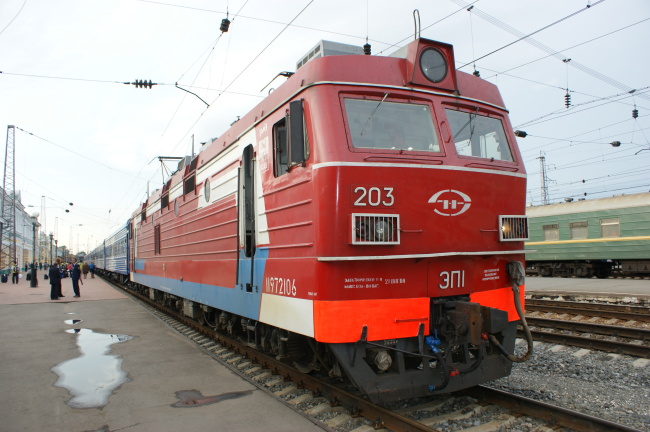More than 250 South Koreans are poised to embark Tuesday on a 20-day journey across Asia and into Europe on a pair of special express trains as part of Seoul’s initiative for greater business and sociocultural cooperation between the two continents.
Under the slogan “One Dream, One Eurasia,” high-profile figures from the political, business, academic and cultural circles as well as dozens of special guests and ordinary citizens will gather in Seoul before flying to Vladivostok and Beijing for two different itineraries covering 14,400 kilometers in total.
In Vladivostok, about 200 of them will take the 12,000-kilometer main route on a charter journey to Berlin, with five additional stops in Russia and one in Warsaw.
A branch line carrying another 50 is to depart from Beijing to join the others in the eastern Russian city of Irkutsk on July 19 via Ulaan Bator.
“The railway is aimed at ushering in a new era for Eurasia based on better communications and cooperation with the vast continent,” Foreign Minister Yun Byung-se said after unveiling singer Yoon Jong-shin and actress Ko Sung-hee as honorary ambassadors for the program last week.
“If Eurasia’s logistics networks meet a trans-peninsular railroad, it will improve the connectivity between Asia and Europe and eventually help lay the groundwork for a peaceful unification of the two Koreas.”
 |
A Trans-Siberian train (KORAIL) |
The project is a key feature of President Park Geun-hye’s “Eurasia Initiative,” which she unveiled last October to boost ties with other related nations by connecting roads and railways such as the Trans-Korean Railway and the wider Trans-Siberian Railroad reaching Europe.
She also proposed the launch of the “Silk Road Express” running from South Korea to Europe via North Korea, Russia and China, as well as an integrated Eurasia power grid and a logistics hub that covers China, Central Asia and Eastern Europe.
It is also in line with Park’s proposed vision to foster peace and trust in Northeast Asia, starting with cooperation on climate change, antiterrorism and other nonpolitical matters, and ultimately progressing to security partnerships.
“Eurasia has various strategic values that can benefit not only a divided peninsula but also a reunified Korea,” Ko Jae-nam, a professor at the state-run Korea National Diplomatic Academy, wrote in a recent report, citing its ample resources reserves, markets for exports and investment, and know-how for peace processes and multinational diplomatic cooperation.
“Given that the Northeast Asia and Eurasia initiatives are built on a mutually driving mechanism also involving the so-called peninsula trust-building process, an expansion and strengthening of security cooperation with Eurasia nations is pivotal for the policies’ success.”
Yet skepticism remains over the project’s limited efficacy, based on Pyongyang’s nonparticipation and a perceived focus on showy events.
With the North being aloof toward the rail programs, the train will inevitably set out in Vladivostok, skipping the upper part of the peninsula.
At each stop, the passengers will take part in forums and seminars on business, logistics, cultural exchanges, foreign affairs and unification, among other subjects.
The final destination will house major events such as a music concert in front of Brandenburg Gate, a conference on unification and a march to the Berlin Wall marking the 25th anniversary of the unification of East and West Germany and the 70th anniversary of the division of the peninsula.
The Foreign Ministry and the state-run Korea Railroad Corp. have channeled 1 billion won ($896,000) and 600 million won, respectively, into the event. With contributions from businesses, the total budget is forecast to top 2 billion won, officials say.
“While the Rajin-Khasan project was a pilot project on freight carriage for the Eurasia Initiative, the express train marked its demonstration of passenger transportation,” said Na Hee-seung, a senior researcher at the Korea Railroad Research Institute. He was referring to the Russian-led initiative to refurbish the North Korean port city of Rajin and a railroad reaching the nearby Russian town of Khasan, involving three South Korean companies ― KORAIL, POSCO and Hyundai Merchant Marine.
“Though North Korea is not taking part in this project, it will send a positive message about inter-Korean railroad cooperation and help expedite its participation in future programs.”
By Shin Hyon-hee (
heeshin@heraldcorp.com)








